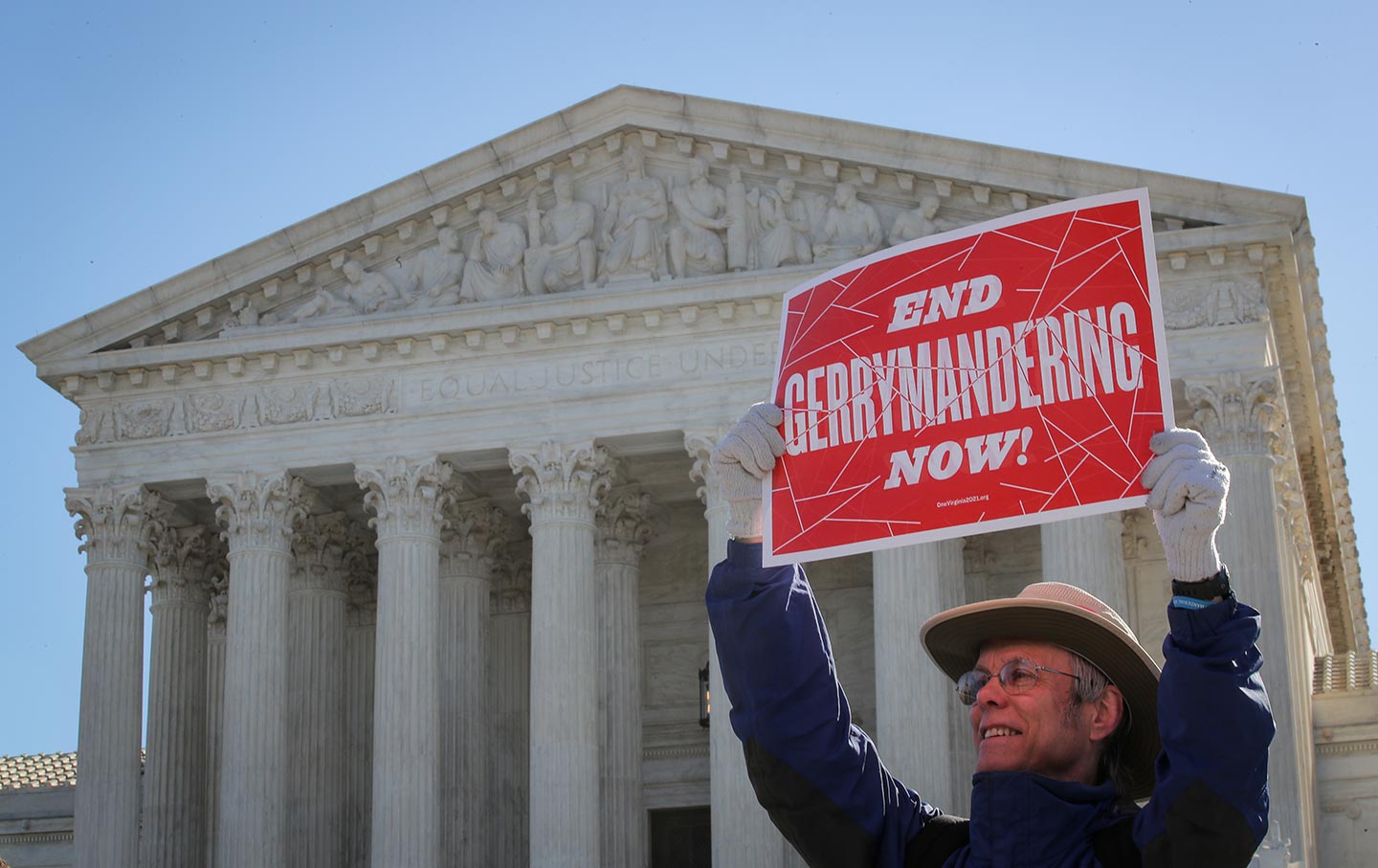How to Beat Trump in a World of Unreason
To counter authoritarian drift, Democrats can’t just swap out nominees. They need to be bold.

An image of President Donald Trump looms over crowds of supporters before his speech from the Ellipse at the White House on Wednesday, January 6, 2021.
(Bill Clark / CQ Roll Call via AP Images)
The prevailing diagnoses for what has ailed American politics since the rise of Donald Trump point to widespread racism, ignorance, and self-harming irrationality. Although these observations are correct, they are not productive. Yes, people are racist, cruel, and irrational, but this is nothing new. Leaning on pop psychology to explain away political failures is dangerously inadequate as a substitute for genuine political response.
Trump’s bellicose public image allows many people to identify with him at the level of primal aggression. Clearly, a large segment of the electorate remains compelled by Trump at unconscious levels of desire. But such energetic attachments are fungible—and transforming those attachments is the task of politics. Trump’s ascent has followed a strategy more consistent with the promotion of a reality-television show than with advancing a coherent political ideology, and it should make clear a vital truth: Effective politics cannot simply reflect the will of the people; it must shape the desires of the electorate.
If we rely on voters’ existing virtuous character, rational deliberation, or deep empathy as a starting point for democratic politics, we will never succeed. Cultivating an ethical responsibility to one another is precisely the work of political organizing and policymaking. The mass energy that goes into racist and authoritarian desire can be redirected, but such redirection can only be achieved by a politics that offers inspiring and inclusive policy agendas capable of addressing disaffection, and aggression.
To date, Democrats have shunned the basic political responsibility to engage with desire and have instead leaned on a mirage of morality and reason. President Joe Biden, who reassured wealthy donors during his 2020 campaign that “nothing will fundamentally change” if he’s in the White House, has failed to provide an ambitious policy vision during his reelection campaign. His case for another four years rests on little more than “we’re not Trump” and a promised return to the same pre-pandemic “normal” that set the stage for Trump’s emergence.
Campaigning to protect the status quo of profound inequality in both wealth and political power has, unsurprisingly, failed to galvanize the discontented segments of the electorate. And polls after Biden’s recent debate fiasco suggest that simply shifting to another Democratic nominee in his place is not likely, by itself, to overcome Trump’s primal appeal come November.
Biden, or whoever replaces him on the ballot, will need to offer something much more. To beat Trump, the Democratic candidate must rally the public around a positive vision for the future that excites mass enthusiasm through transformative policies and affectively rousing narratives. These could include a wealth tax on the ultra-rich, guaranteed basic income, mass student and medical debt forgiveness, a renewed public health system organized around community care workers, guaranteed universal rights to housing and healthcare, and large-scale investment in public arts initiatives to cultivate belonging and community in a nation currently plagued by isolation and despair.
With a short timeframe before November, candidates don’t need to invent such plans from scratch. They could draw from existing bills and policy proposals, such as the Green New Deal to address climate change, the People’s Response Act to end mass incarceration and build preventative community care systems, the Futures Agenda to revitalize youth opportunity and education, and various proposals for restructuring the anti-democratic institutions of the Supreme Court, Senate, and Electoral College.
For decades, at least since President Bill Clinton devoted himself to dismantling—or, as he put it, “reforming”—public welfare systems, Democratic Party leadership has refused to back ambitious policies for public programs and even frequently joined right-wing politicians in dismissing them as “radical socialist” utopianism. Democrats have instead repeatedly used their power to hollow out the state and empower profiteering businesses in its place, leaving struggling Americans at the mercy of private corporations and their lobbies. This has intensified inequality. It has eroded public trust in both government and civic institutions, including the Democratic Party itself. And it has pushed discontented voters to far-right demagogues who, having now taken over the Republican Party, validate their discontent while promising to give them a radically different future in which to believe.
Nearly a century ago during a political period with marked similarities to our own, an influential German legal theorist argued that the underlying nature of political struggle is defined by the distinction between friends and enemies. In this paradigm, you’re either with me or against me; either loyal to me or worthless. This man, Carl Schmitt, became a supporter of the Nazi regime. From his perspective, both liberal and conservative leaders had failed to embrace the power of mobilizing hatred of “the enemy” as a political strategy for unifying the masses to consolidate power and reinspire national pride and purpose. In contrast to this weakness, Hitler’s boldness in suspending legal codes, declaring a state of emergency, and mobilizing hatred for an enemy excited Schmitt, who praised Nazism for “recultivating traditional concepts.”
Popular
“swipe left below to view more authors”Swipe →We saw elements of a similar strategy in the Trump administration, though we should be careful not to exaggerate Trump’s exceptionalism. As Corey Robin, Samuel Moyn, and others have pointed out, Trump implemented many of his most reactionary measures through standard constitutional structures, and George W. Bush and Dick Cheney’s War on Terror—which only deepened under Obama and Biden—may be an even stronger illustration of Schmittian politics. Even so, it is not difficult to recall the invented enemies against which Trump has gathered his friends: He has demonized immigrants and Mexicans, Muslims, the news media, Black Lives Matter, and “the radical socialist left.”
The horrors of the Holocaust and now also the far-right Israeli government’s massacres of Palestinian civilians in Gaza make clear the hazards of such a political strategy within conservative politics, while Stalinism and Maoism offer illustrations of its potential for violent embrace from the left. But American liberals must not ignore the relevance of Schmitt’s critique for themselves. From Schmitt’s view, liberal democracy typically responds to the friend-enemy dynamic not by encouraging and intensifying it, as authoritarianism does, but by using systems of law, order, and constitutional proceduralisms to disguise underlying structural conflicts without addressing them.
An example of this strategy of denial can be found in the empty invocations of “unity” without changing the material distribution of resources and opportunity. The realities of extreme wealth inequality, high rates of poverty, real wage stagnation, systemic racism, mass incarceration, and a profiteering private healthcare system that imposes tens of thousands of unnecessary deaths annually due to economic barriers to care have all persisted through decades of “unity” rhetoric. This language has most often functioned in service of commitments to strengthening market fundamentalism and perpetuating racial hierarchies rather than to advance equality, justice, and shared responsibility to care for the most vulnerable.
The philosopher Walter Benjamin, who while fleeing the Nazis killed himself to avoid deportation to a concentration camp, offered a counterpoint to Schmitt’s reactionary political vision. In his well-known 1935 essay, “The Work of Art in the Age of Mechanical Reproduction,” Benjamin described the convergence of two forces to explain the rise of violent far-right politics: (1.) the vulnerability of the working class exploited by an economic system that intensifies wealth at the top but does little for most working people, and (2.) the promise of fascism to give them opportunities for the free expression of anger and hatred for an invented enemy. As Benjamin wrote, “Fascism sees its salvation in giving these masses not their right, but instead a chance to express themselves. The masses have a right to change property relations; Fascism seeks to give them an expression while preserving property.”
A politics that offers neither changes in the property structure of American society nor an affectively compelling alternative to the violent political expressions mobilized by figures like Trump is not likely to redirect the energies of the electorate.
Both Benjamin and Schmitt wrote from within a proto-fascist environment shaped by capitalism and modern bureaucracy that Max Weber famously characterized as suffering from a pronounced disenchantment. But, unlike Weber, both Benjamin and Schmitt recognized that the irrational energy that once found partial release through historical forms of enchantment, such as religious belief, did not disappear; it is now free-floating, available to whoever can provide it with power and, most of all, a feeling of vitality or aliveness.
Trump’s popularity shows that we are not now less enchanted than in times past. If anything, we are more readily enchanted by a passing fad, celebrity, or aspiring political strongman. In a world in which reality-television stars wield more power than administrative experts, the manipulability of our ostensibly disenchanted life remains the political problem of our time. It is with this now wide-open space of untethered feeling and hunger for belief in something—whether true or false—that any viable politics must find a way to effectively engage.
For either liberals or leftists to do so, we must formulate and visibly implement policies accompanied by narratives that affectively ignite rather than vainly attempt to moderate the electorate. Trump and the global far right’s mounting successes bear a lesson: Neither neoliberal policy nor displays of managerial competence can provide a long-term path forward without transformational social visions.
Only by mobilizing the power of mass feeling tied to grand public visions and concrete policies can we generate the popular leverage to effectively fight for collective care, economic equality, and a society that values shared beauty and belonging over destruction and division. If the Democratic Party fails to take on this task, it will continue to foster the ideal conditions for the growth of right-wing populisms with their characteristic xenophobic, militaristic, and police-state manipulations.
As Trumpism overwhelms the flailing project of American democracy, the nation’s leaders are refusing to channel the energy of the electorate into bold projects for the common good. To stop Trump and, more importantly, to stop allowing the country to be held hostage by far-right threats with every new election cycle and Supreme Court session, Democrats must do more than simply swap out the names listed on their presidential ticket.
Disobey authoritarians, support The Nation
Over the past year you’ve read Nation writers like Elie Mystal, Kaveh Akbar, John Nichols, Joan Walsh, Bryce Covert, Dave Zirin, Jeet Heer, Michael T. Klare, Katha Pollitt, Amy Littlefield, Gregg Gonsalves, and Sasha Abramsky take on the Trump family’s corruption, set the record straight about Robert F. Kennedy Jr.’s catastrophic Make America Healthy Again movement, survey the fallout and human cost of the DOGE wrecking ball, anticipate the Supreme Court’s dangerous antidemocratic rulings, and amplify successful tactics of resistance on the streets and in Congress.
We publish these stories because when members of our communities are being abducted, household debt is climbing, and AI data centers are causing water and electricity shortages, we have a duty as journalists to do all we can to inform the public.
In 2026, our aim is to do more than ever before—but we need your support to make that happen.
Through December 31, a generous donor will match all donations up to $75,000. That means that your contribution will be doubled, dollar for dollar. If we hit the full match, we’ll be starting 2026 with $150,000 to invest in the stories that impact real people’s lives—the kinds of stories that billionaire-owned, corporate-backed outlets aren’t covering.
With your support, our team will publish major stories that the president and his allies won’t want you to read. We’ll cover the emerging military-tech industrial complex and matters of war, peace, and surveillance, as well as the affordability crisis, hunger, housing, healthcare, the environment, attacks on reproductive rights, and much more. At the same time, we’ll imagine alternatives to Trumpian rule and uplift efforts to create a better world, here and now.
While your gift has twice the impact, I’m asking you to support The Nation with a donation today. You’ll empower the journalists, editors, and fact-checkers best equipped to hold this authoritarian administration to account.
I hope you won’t miss this moment—donate to The Nation today.
Onward,
Katrina vanden Heuvel
Editor and publisher, The Nation
More from The Nation

How Rob Reiner Tipped the Balance Against Donald Trump How Rob Reiner Tipped the Balance Against Donald Trump
Trump’s crude disdain for the slain filmmaker was undoubtedly rooted in the fact that Reiner so ably used his talents to help dethrone him in 2020.

The Economy Is Flatlining—and So Is Trump The Economy Is Flatlining—and So Is Trump
The president’s usual tricks are no match for a weakening jobs market and persistent inflation.

Trump’s Vile Rob Reiner Comments Show How Much He Has Debased His Office Trump’s Vile Rob Reiner Comments Show How Much He Has Debased His Office
Every day, Trump is saying and doing things that would get most elementary school children suspended.

How the Groypers Hope to Remake Trump's GOP How the Groypers Hope to Remake Trump's GOP
The perilous politics behind the elevation of Nick Fuentes.




